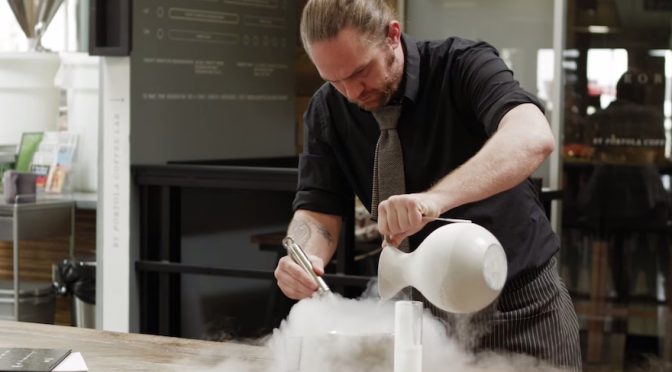The ever-intensifying world of coffee has only ramped up in recent years with the introduction of complex filtration methods and apparatuses intended to bring out every flavor of the bean. Thus, it comes as no shock that such a thing as the National Barista Championship exists. The recent zeal for coffee, called the Third Wave, in the United States is manifested by the competitors selected for portrayal in the documentary Barista by director Rock Baijnauth (whose previous work included The Pirate Tapes).
Baijnauth takes his time revealing the caffeine-driven inner workings of five contestants, Eden Abramowicz (from Intelligentsia Coffee in Los Angeles), Charlie Habegger (from Intelligentsia Coffee in Chicago), Charles Babinski (a founder of two coffee shops in L.A. and a notorious winner of second place), Ryan Redden (from Portola Coffee in Costa Mesa) and Truman Severson (from Theorem in Costa Mesa).
Each one brings their own unique take on coffee to the bar, with their own unique mania as well. For Eden, the approach is cut and dried, while Charlie prefers to talk about the biological makeup of coffee. Ryan tries his hand at the sorcery of making homemade ice cream before his samplers so as to create a signature affogato, and Truman brings devices to the “stage” that make him appear as a mad scientist. Charles merely does what’s necessary to take second place.
For an hour and forty-two minute documentary, Barista seems to say little about the underbelly of life as a coffee maker. There is a brief moment when Baijnauth touches on the dark side of having an ardor that barely pays the bills, flashing the factoid: “The average salary for a barista is $15,084 per year.” Considering that the places baristas tend to flock to make their money/find a culture devoted to coffee are larger (read: expensive) metropolises like New York, Los Angeles and Chicago, it’s a cruel irony that the pay is so low in places that demand such a high cost of living.
Indeed, for those who aim to pursue the art of coffee making in the long-term, it is expected of them to open their own business at some point if they aim to be viewed as “respectable.” And this is the element of being a barista that should have been explored in greater depth in order to make the documentary more engaging–to go beyond merely documenting a competition and the moments leading up to it. Because such a profession is one of the great indications of how skewed pay grades are in the U.S. for those who wish to pursue a career based on passion.





















